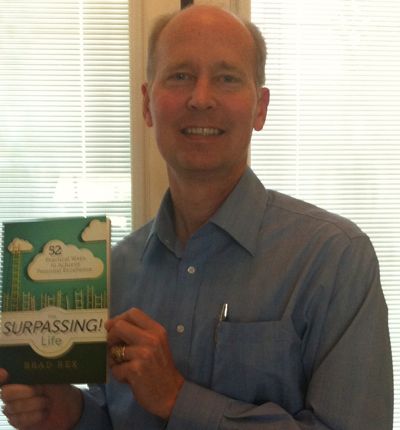In today’s post, our frequent guest columnist Brad Rex, weighs in on the importance of communication; specifically, answering e-mails in a timely fashion.
Now I don’t know about you, but it seems like e-mails stack up incessantly in my five (!) e-mail inboxes, not to mention Direct Messages sent via Twitter and Facebook that always seem to demand a quick response.
So 1,000 E-mails, an excerpted chapter from Brad’s recently released book, “The Surpassing! Life: 52 Practical Ways to Achieve Personal Excellence,” is sure to help all of us deal with today’s explosion in communication channels and the many ways we interact with friends, family, and coworkers.
The speed of the boss is the speed of the team.–Lee Iacocca
But you, Timothy, man of God: . . . Run hard and fast in the faith.–Bible, 1 Timothy 6:11
It bugs me when I call or e-mail someone and don’t get a response. My mind considers the possibilities: Is their voicemail or e-mail not working? Is the person on vacation? Have I offended them and they are refusing to reply because of the offense?
Then, a few days later, I’m forced into new decisions: Do I contact them again? If I called last time, should I use e-mail this time? Should I check with someone else to find out if they are on vacation?
All of this would be unnecessary if people responded within 24 hours to their messages. I have set this as a personal goal, and find that it benefits me and the people who are contacting me, in numerous ways:
• It strengthens my personal and business reputation. People know if they send me an e-mail, I will respond, and respond quickly.
• It requires me to manage my schedule effectively, building in adequate time to reply expediently.
• It forces me to delegate in order to effectively manage the number of messages I receive.
• It prevents issues from escalating, as they are resolved swiftly.
• It reduces stress, as I don’t have e-mails and calls building up over time.
• It is efficient, as I handle the issue immediately rather than putting it off and having to familiarize myself with it again later.
• It keeps me on top of rapidly changing situations, rather than being several days behind others.
When I discuss 24-hour response, the usual retort is “Sounds like a great idea, but there is no way I could ever do that with all the e-mails I get. I must get 1,000 e-mails a day!”
I reply, “If you are getting 1,000 e-mails a day, you are either a significant micro-manager or on every spammers’ address list.”
If the quantity of e-mails you receive is overwhelming, you need to reduce it by critically reviewing every e-mail that you receive and decide:
• Do I absolutely have to handle this, or can I delegate it to someone else?
• Do I need this information on an on-going basis?
• Am I being “over-informed” by a person on my team, with many e-mails telling me everything they are doing in unnecessary detail?
• Is this junk e-mail that I can stop by unsubscribing to it?
With a goal of responding in 24 hours, you can easily monitor your success, and ruthlessly reduce your e-mail to meet the target. You may find your e-mails significantly reduced, as people don’t have to send you multiple follow-up messages, since you are now responding quickly!
Action Points
• Commit to reply to your e-mails and messages within 24 hours.
• Put in place a process to ensure you meet your commitment.
• Reduce the number of e-mails that you get by critically reviewing each one.
Payoff
Less stress, a strong professional reputation, greater productivity.














































